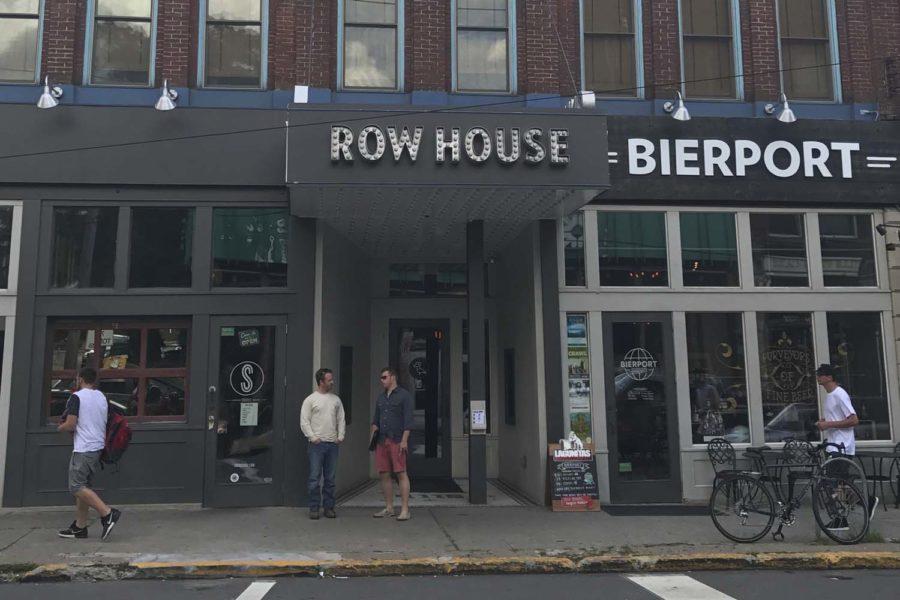Reel Q film festival brings queer cinema to Lawrenceville
The Row House Cinema is home to the 34th annual Reel Q Pittsburgh LGBTQ+ Film Festival.
October 7, 2019
The Row House Cinema was bustling Saturday with festival organizers, sporting “drag queen in training” pins on their shirts as they maneuvered lines stretching into the hallways beyond the small, 83-seat theater.
The 34th annual Reel Q Pittsburgh LGBTQ+ Film Festival kicked off its third day on Saturday with a stacked lineup of queer-centric cinema — including 12 short films, one documentary and three feature-length movies. The festival provides audiences with a diverse selection of LGBTQ+ films from Oct. 3 to 12. Tickets were priced at 10$ for general admission and $7 for students, with other higher-priced options for multiple-day passes.
Reel Q Film Festival’s Executive Director T.J. Murphy said the festival was a special opportunity for audiences to see films that are not typically shown anywhere else.
“People are hungry to see things like this,” Murphy said. “The content is out there, and the filmmakers want it to be seen, so I think that we need to create that space for the audience.”
Since he assumed the head manager position last year, Murphy has looked to expand the festival’s size and program variety. Last year’s festival lasted only a weekend, but this year, the festival is presenting a full lineup of 19 feature-length films and 60 short films over the course of a week. Audiences flocked to all of the screenings Saturday, despite the fact that this was the festival’s first year at Row House Cinema. Hannah Waltz, Reel Q’s programming director, said the switch was just another part of their continued outreach initiative.
“This is kind of a new era for Reel Q,” Waltz said. “We’re really beefing up our programming and our other programming arms around the City, and Lawrenceville is another neighborhood that we’re trying to grow a community in. This theater is super community-oriented, so it’s a really good fit.
In previous years, the festival took place at the Harris Theater in Downtown, although Murphy said that multiple venues across Pittsburgh have called themselves home to Reel Q at some point since the festival began in 1985.
“We’ve also been at the [Andy] Warhol [Museum],” Murphy said. “We’ve been at Southside Works, we’ve kind of moved around a little bit. We tend to stay somewhere for a few years and then make a transition from there.”
The 16 films screened Saturday night were chosen from a batch of 300 short films and 60-70 feature-length submissions submitted to the festival throughout the first six months of the year. Although the festival favors films made by Pittsburgh locals, submissions were not excluded based on origin, and many were made by international filmmakers, spanning a broad range of genres and subject matters.
In charge of sifting through the hundreds of submissions was the festival’s 13-person screening committee. David Doorley, Reel Q’s marketing director and screening committee member, said the committee goes through an exhaustive watching-and-discussing process before settling on a film for the festival.
“I’d say that for every film we show, we’ve probably seen 10 or 15 others that we decided not to use,” Doorley said.
Though it is now a large festival receiving hundreds of submissions, Reel Q started small, bolstered by deep roots in Pittsburgh’s LGBTQ+ scene. It was founded in 1985 as a part of Pittsburgh’s Gay and Lesbian Community Center, now known as the Pittsburgh Equality Center. Originally a subset of the Center’s Lesbian and Gay Film Series, the series eventually grew into its own entity, forming a board of directors and holding its first official film festival in 1986.
The festival eventually became a non-profit organization in 1987 and continued to broaden its services through the ’90s. As expansive and in-depth as the Reel Q Festival’s history is, it’s humble background was not lost on Murphy, even with his fairly recent involvement.
“Through the 90s it grew by days, and then it was a week, and then it was 10 days,” Murphy said. “We changed locations all over and started doing more one-off projects outside of the festival.”
Now in its 34th year, the festival hosts a robust selection of year-round programs in addition to Reel Q. Lighter-hearted, kid-friendly films are featured during the Reel Youth program at the Glitterbox Theater in Oakland, and Reel Stories, held at City of Asylum in Northside, focuses on international films.
As the audience walked into each film screening that night, festival organizers handed everyone a pink ballot where they could rate the movie they were about to see — a way for the festival to collect audience reactions and grant awards to the films at the end of the festival.
The festival compiled the awards into a variety of categories for men, women and transgender people, including best feature film, short film and documentary. However, Murphy said the award winner’s prizes are increased publicity and visibility, not money.
“We send out laurels and promote [the award winners] throughout the year,” Murphy said. “I mean, if films come back and have their anniversaries we’ll usually replay them at the festival. We definitely continue to promote those films. And it would be nice if eventually one day we had enough money to give somebody a cash prize.”
Although each of the films shown on Saturday spanned a wide range of styles and subject matters, each one promoted the festival’s main point, which is to increase the amount of queer representation in cinema. Longtime Reel Q board member Doorley said that it was his personal experience with the lack of gay representation on screen that pushed him to create a space for fellow LGBTQ+ community members.
“I can remember when I was growing up, or even into the ’80s, when I never saw gay characters on screen,” Doorley said.








